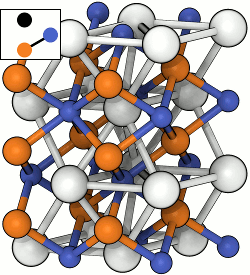Dallas R. Trinkle
Research Group
Computational Materials Science
 Our group studies both properties of defects in materials, chemical effects on mechanical properties of advanced structural metals, and mass transport. Defects play a crucial role in material properties, and predicting defect properties at atomic length scales is a challenging area of computational research. Improving and controlling mechanical behavior of structural metals is key to improving energy efficiency through weight reduction (automotive and aerospace) or increasing operational temperatures (turbines for aerospace and energy production).
Our group studies both properties of defects in materials, chemical effects on mechanical properties of advanced structural metals, and mass transport. Defects play a crucial role in material properties, and predicting defect properties at atomic length scales is a challenging area of computational research. Improving and controlling mechanical behavior of structural metals is key to improving energy efficiency through weight reduction (automotive and aerospace) or increasing operational temperatures (turbines for aerospace and energy production).
We use atomistic methods—electronic structure, tight-binding, classical potentials—coupled to larger length-scale models—continuum elasticity, statistical mechanics—to predict properties for real materials. We also work with and build approximate atomistic models that are computationally faster than electronic structure, to directly study longer length and time scales. Finally, we use and construct new techniques that extend the geometric limitations in electronic structure methods. These techniques find application across all areas of materials science: metals, semiconductors, ceramics, and even polymers. See current research projects and publications for more information about what we do. You can also see the UIUC CSE Fall 2013 seminar “Dislocations with first principles: From defects to materials behavior in magnesium.”
We have recently put our magnesium solute database online. Also see GitHub:DallasTrinkle and GitHub:TrinkleGroup and Zenodo (or local downloads which may not be up-to-date) for available code developed by the Trinkle research group.
I am looking to hire motivated, interested students and postdocs.
- Undergraduate and Ph.D students: please read a note for prospective students and then contact me.
- Postdoctoral researchers: please contact me about current postdoctoral positions.
We are supported by industrial and government funding, including






